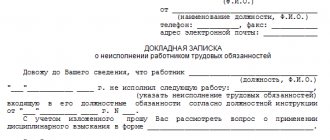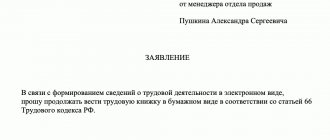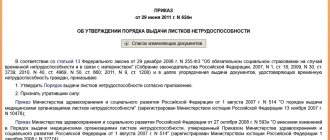Free legal consultation by phone:
8
Disciplinary action is the legal right of an employer to apply it to an employee for misconduct, that is, for failure to fulfill his duties or their improper performance.
The procedure for applying such an action, as well as the established deadlines, are regulated by Articles 192 and 193 of the Labor Code of the Russian Federation. Moreover, their incorrect application or imposition after the expiration of the prescribed period will lead to the loss of such right by the employer. In this article we will look at the period during which a penalty can be applied and how much time the Labor Code of the Russian Federation provides for appealing it.
Article 192
Article 193
When is disciplinary action taken?
It is legally established that an employer has the right to punish an employee in the following situations:
- failure to fulfill obligations under an employment contract;
- performing duties improperly.
Expert commentary
Kamensky Yuri
Lawyer
In both cases, the blame for the misconduct must lie with the employee. If an employee cannot perform his duties due to downtime of the enterprise or for other reasons that do not depend on him, then the employer does not have the right to impose a disciplinary sanction on him.
Among the main reasons for which punishment is imposed are violations of labor discipline, including:
- being late;
- absenteeism;
- failure to follow orders from the manager;
- appearing at the workplace under the influence of alcohol or drugs, etc.
Disciplinary violations depend on the specifics of the enterprise or company. Penalties may also be provided for violation of confidentiality of information or disclosure of trade secrets.
The employee’s misconduct must be documented, which is the basis for disciplinary action. This can be done in several ways:
- medical examination;
- explanatory note from the employee;
- decision of the commission on causing damage to the organization;
- act of refusal to write an explanatory note or undergo a medical examination.
A disciplinary sanction is formalized by an administrative act of the head of the organization. Before applying a disciplinary sanction, the employer must require an explanatory note from the employee. If the employee refuses to provide explanations, a corresponding report is drawn up about this within two days.
Order on disciplinary action in the form of a reprimand (sample) Order on disciplinary action in the form of a remark (sample)
Order of disciplinary action in the form of dismissal (sample)
Act on the employee’s refusal to familiarize himself with the order (sample)
conclusions
As a general rule, a disciplinary sanction is considered valid for 1 year. If desired by the employer, trade union specialists, employee or his manager, the validity period can be shortened.
This is possible if the employee:
- performed his job duties flawlessly for a long time;
- exceeded the planned performance indicators;
- took an active part in the life of the company;
- prevented an accident or emergency.
If such a decision is made, an order is issued and changes are made to the employee’s personal card. Documentation containing a mark indicating the imposition of liability is destroyed.
Types of disciplinary action
Punishment for misconduct in the workplace can vary. Labor legislation specifies the types of disciplinary sanctions:
- comment;
- rebuke;
- termination of the employment contract.
There are categories of employees for whom there are other types of punishments, including deprivation of a badge, reduction in rank, etc. Civil servants may be issued a decision on official inconsistency.
The following disciplinary measures are provided for military personnel:
- demotion in rank;
- severe reprimand;
- incomplete job compliance;
- early termination of the contract, etc.
When choosing a punishment, the manager should be guided by the following recommendations:
- A penalty can only be imposed if the offense is directly related to the employee’s duties as specified in the employment contract.
- One violation carries only one type of punishment.
- If the offense is not dangerous and does not cause damage to production, then you can limit yourself to a remark.
- When choosing a punishment, the severity of the guilt and the consequences of the violation should be taken into account.
Expert commentary
Potapova Svetlana
Lawyer
The labor legislation does not have clear instructions on what types of offenses are punishable by a certain type of penalty. Therefore, this moment remains at the discretion of the employer.
Dismissal is an extreme disciplinary measure
Of the three types of disciplinary penalties, dismissal is permanent and often irreversible. This penalty is usually used as a last resort, when the employee’s misconduct is incompatible with the further performance of his official duties.
Misconduct leading to dismissal may include:
- a single gross violation of the prescribed labor discipline and work rules;
- absenteeism without good reason;
- absence of an employee from the workplace for four or more hours without a valid reason;
- actions resulting in injury or death;
- damage to the employer’s property, including those associated with insufficient competence;
- theft in the workplace of both the property of the employer and other employees, in addition, in this case, a criminal case may be opened on behalf of the enterprise;
- administrative offenses that do not directly affect the work, but worsen the image of the company;
- actions discrediting the employer;
- dissemination of confidential and classified information;
- gross lack of compliance with work ethics and subordination;
- direct refusal to perform official duties specified in the contract;
- participation in a strike without following the procedure prescribed by law.
When dismissing someone for misconduct or another guilty act, the employer should approach the paperwork as responsibly as possible. In this case, a clear conflict of interest arises, and the employee may consider such a measure of punishment to be unlawful. In case of violations of the penalty procedure, he can be reinstated in his position by the court authorities or the labor inspectorate.
First of all, personnel service employees should prepare testimony confirming the employee’s guilt. These must be two or more members of the workforce, and they must be witnesses to the misconduct. Documented expert opinions would be helpful. You should also use any technical materials confirming the misconduct: recordings from CCTV cameras, auto-registration indicators, photographs of the workplace with date and time.
The employee must be required to provide a written explanation of the misconduct. This document, along with others, is sent for consideration by the representative body. They must decide on the legality of imposing the penalty of dismissal.
The last document is an order or instruction; its form is unified. A corresponding entry is made in the work book, with the wording from the labor code and a mandatory link to the article.
Time limits for imposing disciplinary sanctions
The Labor Code of the Russian Federation establishes a statute of limitations for punishing an employee for misconduct. This is to protect employees from unjustified disciplinary action. After a certain time, the offense loses its relevance, therefore, the employee should not be punished.
Important! A disciplinary sanction may be imposed no later than a month after its discovery. This period is calculated from the day when the employer learned about the commission of an offense. If a violation is detected by another employee, he must notify the manager. If the penalty is imposed later, the employee has the right to file a complaint with the labor inspectorate about the illegality of the manager’s actions. In this case, the employer may be fined.
The legislation also provides for other deadlines for imposing disciplinary sanctions:
- The penalty cannot be later than 6 months from the date on which it was discovered, even if the employee is on sick leave, on vacation, or there are other circumstances that do not allow issuing a penalty order.
- The punishment period for corruption violations is 3 years.
- In cases where an audit or revision is necessary to identify dishonest performance of duties, a disciplinary sanction may be imposed for 2 years.
Material punishment (deprivation of bonuses, allowances, fines, etc.) is often practiced by employers. However, it does not apply to disciplinary action specified in labor legislation. Therefore, in addition to material punishment, a reprimand or reprimand is allowed. In cases regulated by Art. 192 of the Labor Code of the Russian Federation, the dismissal of an employee is possible. Termination of an employment contract is done when the employee commits an immoral offense or actions leading to loss of trust.
How to punish a specialist who has committed an offense?
In Art. 192 of the Labor Code of the Russian Federation states that in relation to a specialist who does not comply with the standards of organizing the work process (for example, being late for work, neglecting safety standards at work) or who does not perform his job functions well enough, management has the right to apply disciplinary penalties. The normative act mentions three types of them:
- comment;
- rebuke;
- dismissal.
When choosing the type of punishment, management is guided by the principle of justice. This means, for example, that for a one-time delay to work by 15 minutes, it is obliged to limit itself to imposing an oral disciplinary sanction; it does not have the right to fire a citizen for this offense.
Holding people accountable is a right, not an obligation, of the employing company. This means that management, for example, is not obliged to fire an employee who has committed absenteeism.
If a specialist is valuable to the company, management may limit themselves to a verbal reprimand or not use any penalties.
If a company decides to hold an employee accountable, it is obliged to strictly implement the algorithm described in Art. 193 Labor Code of the Russian Federation. It includes the following steps:
- Recording a violation. Depending on its type, an act or memo is drawn up addressed to the company’s management.
- Receiving written explanations from the offender. According to the provisions of Art. 193 of the Labor Code of the Russian Federation, he provides comments to his superiors within 2 days from the date of receipt of the request. If he refuses to do this, a corresponding act is drawn up.
- Analysis of the specialist’s explanations. The law leaves the company the right to independently decide whether the reasons for the violation are valid. The latter usually includes illness, testimony before the Ministry of Internal Affairs, emergency situations, etc. If the authorities justify the specialist’s actions, administrative liability does not arise; otherwise, a penalty is chosen.
- Issuance of an order. It contains information about the employee (full name, position, personnel number) and the chosen punishment. The document is presented to the citizen against signature. If he refuses to read it, a special note is made.
According to Art. 193 of the Labor Code of the Russian Federation, for one violation an employee is punished strictly once. The company is obliged to comply with legislative algorithms, otherwise a specialist will be able to complain about unlawful actions of management to regulatory authorities.
Duration of punishment
A disciplinary sanction in the form of a reprimand or reprimand is valid for one year. Once the misconduct is discovered, the employer issues an order to punish the person responsible. The period of validity of the penalty begins from the day on which the administrative act is dated. During this period, the employee may be deprived of bonuses, additional payments and other bonuses that he is entitled to.
The manager does not have the right to reduce or increase the duration of the punishment at his own discretion. However, he can remove disciplinary liability from the employee at any time. For this purpose, an order is issued at the organization level. The labor inspectorate, prosecutor's office and other services cannot influence the reduction of the duration of the disciplinary sanction.
Order to lift a disciplinary sanction (sample)
The punishment is valid for one year after the relevant order is issued. After this period, the disciplinary sanction is lifted from the employee. The exception is one more misconduct in the workplace that entails punishment. In this case, the validity period of the disciplinary sanction is extended from the day when a new decision was made on the employee’s guilt.
Consequences of disciplinary punishment for the employee and employer
All disciplinary measures cause staff not only economic, but also psychological harm. After receiving the first comment, there may be a significant decrease in work enthusiasm and an even greater deterioration in production performance.
However, such a negative incentive can have a positive effect in the future. The employee begins to take a more responsible attitude towards the production process, monitors the work regime and improves his skills.
The employer should assume how this or that type of punishment will affect the production process. There is no need to punish employees for the slightest insignificant offense. Being a couple of minutes late is a reason to express dissatisfaction, but not so significant as to issue an official reprimand. As a result, an employer who abuses penalties develops a bad reputation in the labor market, and it becomes increasingly difficult for him to find new employees.
Disciplinary action affects both the employee and the organization. Employees should understand that such measures are often forced and almost always temporary. With further observance of discipline, the duration of the punishment will be a year, or maybe less.
Deadlines for reviewing the order
The order to impose punishment must be brought to the attention of the employee. The employee must sign that he has read the document. This action does not confirm agreement with the manager’s opinion. If an employee refuses to sign an order, then an act is drawn up where this point is indicated.
Expert commentary
Kireev Maxim
Lawyer
There are no specific deadlines for familiarization with the document in the legislation. The employee may be on vacation or sick leave, which interferes with the procedure. But the employer is obliged to make known the penalties taken as soon as possible.
What can they be punished for?
The legislator considers the following to be a disciplinary offense for which the employer has the right to punish an employee:
- failure to fulfill labor duties through the fault of an employee;
- performing job duties improperly (this must also be the employee’s fault).
The company's management needs to know that the following are not a disciplinary offense:
- any violations on the part of the employee that are not related to his work duties;
- if the negative circumstances that arise are not the employee’s fault;
- if there is no causal connection between the violation of duties on the part of the employee and the negative consequences that occur.
A disciplinary sanction cannot be applied later than one month from the date of discovery of the violation.
The legislator determined that the day the misconduct was discovered is considered the day when the employee’s manager (the one to whom the offender reports at work) became aware of the commission of the misconduct. It does not matter whether the manager (the one who discovered the misconduct) has the right to apply disciplinary action. This means that if management discovers that its employee has committed an offense later than one month, then it will no longer be able to punish him for this offense. The application of a penalty in this case will be illegal, and the employer himself may be held liable and subject to heavy fines.
Appeal period
The employee may not agree with the disciplinary sanction and may not admit his guilt. In such a situation, it is possible to challenge the punishment. The law provides for time limits for appealing a penalty. They depend on the seriousness of the offense and the punishment that was applied:
- An order for a reprimand or reprimand can be contested within 3 months after its issuance. The countdown of the period begins from the moment the employee familiarizes himself with the order.
- If dismissed for labor misconduct, an employee can file a complaint against the manager’s unlawful actions within a month. The period is counted from the moment the employee received a copy of the order to terminate his employment contract.
You can appeal the punishment to the labor inspectorate, the prosecutor's office or the courts. To do this, you need to write a statement indicating violations on the part of the employer. The document is accompanied by evidence that the punishment is not justified.
An employee’s application to the labor dispute commission regarding a disciplinary sanction (sample) Statement of claim to appeal a disciplinary sanction (sample)
If a labor inspector or judge finds violations in the actions of the employer, then a fine of up to 50,000 rubles may be issued to him (Article 5.27 of the Code of Administrative Offenses of the Russian Federation). If an employment contract with an employee is illegally terminated, he must be reinstated in his previous position. The court has the right to oblige the employer to pay the employee wages for a period of downtime through no fault of his own, as well as moral compensation.
The deadline for appealing a disciplinary sanction can be restored if missed for a valid reason. The latter include a business trip, sick leave, etc. The employee must provide documentary evidence that there were good reasons for not filing a complaint within the period established by law.
Expert commentary
Kolesnikova Anna
Lawyer
The validity period of a disciplinary sanction cannot exceed one year from the date of the decision on it. The only exceptions are situations when an employee repeatedly commits violations. In this case, the period of validity of the punishment will be increased by another year from the date of publication of the new administrative document.
The manager can punish an employee within a month after he commits a disciplinary offense, for which a corresponding decree is issued. The employer may issue a reprimand or reprimand, depending on the severity of the violation. In some cases, provision is made for the dismissal of an employee at the initiative of the manager. If the employee disagrees with the severity of the offense, he can appeal the employer’s decision within a month in court.
Summary
A disciplinary offense is understood as any violation by an employee of the terms of an employment contract, legal norms or local regulations. To confirm the facts of violations, an internal investigation is conducted at the enterprise, and an explanation is requested from the employee. Disciplinary penalties under the Labor Code include warning, reprimand or dismissal.
The duration of the sanction cannot exceed 1 year if the employee has not committed new offenses. You can appeal the order within 3 months, and in case of dismissal - no later than 1 month. If you need help asserting your legal rights when imposing disciplinary sanctions, contact our lawyers for help. You can get advice by calling the numbers listed on the website or using the feedback form.











